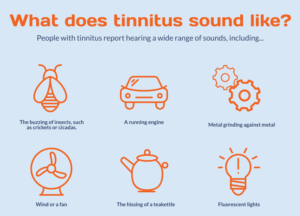Do You Hear Ringing?
Tinnitus (pronounced tih-NITE-us or TIN-ih-tus) is sound perceived in the head with no external source. For many, it’s a ringing sound, while for others, it’s whistling, buzzing, chirping, hissing, humming, roaring, or even shrieking. The sound may seem to come from one ear or both, from inside the head or from a distance. It may be constant or intermittent, steady or pulsating.
Millions of Americans experience tinnitus, often to a debilitating degree, making it one of the most common health conditions in the country. Roughly 50 million people struggle with some form of tinnitus. About 20 million are dealing with burdensome chronic tinnitus, while 2 million have extreme and debilitating cases. 1
Tinnitus is typically caused by:
- Hearing Loss: Most people who have tinnitus also have hearing loss.
- Loud Noise: Exposure to loud noise can cause permanent hearing loss and tinnitus. Continued exposure can make the tinnitus and hearing loss become worse.
- Medication: More than 200 medicines, including aspirin, can cause tinnitus. If you have tinnitus and you take medicine, ask your doctor or pharmacist whether your medicine could be the cause.
Tinnitus is at times very distressing, but it is not a life-threatening condition. Most people who experience tinnitus learn to manage it through “self-help.” A visit to your doctor’s office will usually reassure you that there are no underlying medical conditions related to your tinnitus, and your quality of life can be recovered.
Quick tinnitus test:
- Do you hear a ringing, roaring, clicking or hissing sound in your ears?
- Do you hear this often or all the time?
- Does the sound bother you a lot?
If you answered yes to any of these questions, you may have tinnitus. Please contact our office to set up an appointment.
How is tinnitus treated?
A careful review of your health history, along with an audiometric test, will identify which of the following is the right treatment option for you:
Hearing Aids provide the dual benefit of enhancing hearing and utilizing internal tinnitus management technology.
Personal Listening Devices like your smartphone can be employed. Use the devices with headphones, earbuds or hearing aids. Utilize music or tinnitus apps as part of tinnitus therapy.
Allergy Treatment may be beneficial if you test positive for allergies. Treatment can have the dual effect of reducing the ringing in your ears and giving you a big boost in energy. Allergies exacerbate tinnitus.
The first step is to contact Hearing Services of Delaware. Their highly skilled audiologists will perform a complete evaluation of your ears and hearing. The goal of this appointment should be for you to understand your ears and hearing and to learn how you can manage your tinnitus.
Hearing Services of Delaware have treatment options for tinnitus and can provide the relief you are looking for.
For more information or to schedule your appointment, call Hearing Services of Delaware, a HearingLife company, at 302-376-3500, or visit www.heardelaware.com.
1American Tinnitus Association



